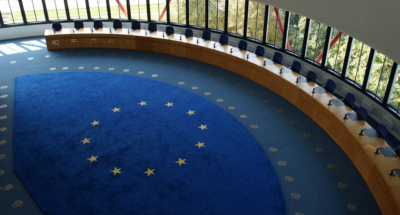
AI and the hidden climate cost of ‘dark data’
Training and fine-tuning AI models requires troves of data, but storing and processing that data is financially and environmentally costly. Here are three ways to address the problem....
Audio available

by Marco Clemente, Christian Vögtlin Published 20 March 2024 in Sustainability • 7 min read
In 1973, two Princeton researchers John Darley and Daniel Batson designed what became known as the “Good Samaritan” experiment, a classic in ethics literature. The participants were Yale seminary students who were studying to become priests. They were asked to write a sermon about ethics, to be delivered in a building on the other side of campus. On the way to the building, they encountered a paid actor slumped in an alleyway.
The researchers wanted to measure how many students would stop and help the person in need. So, they created three conditions, manipulating the level of “hurriedness” to reach the next building. The results showed that about 63% of the students in the low hurry condition provided some help to the actor, compared to 45% in the middle condition and only 10% in the high hurry condition. Darley and Batson concluded that an external condition – in this case, being in a hurry – influenced people’s ethical behavior. The irony and paradox of this experiment is not only that people in a hurry are less likely to help others, but that the participants were seminary students who were going to speak about the parable of the Good Samaritan!
This experiment and other studies show that hurriedness can be a driver of unethical behavior, even when the goal is a good one. Ethics research has shown that being fixed on a goal (even a good goal) can create so-called “tunnel vision”: when managers focus on a specific goal, they overlook the ethical implications of their business decisions and that results in unethical – even illegal – behavior.
In fact, we now know that most of the unethical or illegal behavior in business does not come from bad people behaving badly, but from good people with good intentions who are influenced by contextual elements, such as hurriedness, tunnel vision, and many others.
It is important to both set a target and discuss the means to reach it.
How does this play out in the context of sustainability? It could be argued that the rush to reach sustainable goals through ambitious sustainable targets set by companies around the world has sometimes resulted in employee misbehavior under the pressure to reach these targets. The 2015 emission scandal of Volkswagen – where employees fabricated software to maliciously reach the “sustainable” target of lower emissions – is an example of how a sustainable target can induce illegal corporate behavior. Now the question is, would Volkswagen be an isolated case or the prime example of a surge in corporate scandals, paradoxically incited by the sustainability targets?
Previous studies already show that stretch goals may enable companies to reach ambitious targets, but, on the other hand, they may also result in negative and unexpected effects, including unethical behavior.
There are three ways that stretch goals may lead to unethical behavior.

Sustainability goal setting, apart from the early identification of material issues in exchange with stakeholders, follows the traditional, linear strategic goal setting logic and results in three-to-five-year, mid-term targets. These targets are usually fixed and, if ambitious, resemble stretch goals. To avoid the pitfalls of stretch goals, companies can develop a range of goals (e.g., scenarios from worst to best case) and specify the pathways to achieve these goals.
Setting a range allows for adjustments during the process and avoids setting too ambitious targets. The specific challenge with sustainability targets is that they are supposed to address grand societal challenges like climate change. These challenges are complex, and their evolution is hard to predict. Moreover, if ambitious, they require substantial restructuring and change efforts within an organization.
Companies should develop KPIs on the goals and remind the companies’ values to reach those. A clear idea of how (not only the means but mostly the values) to reach ambitious goals helps to avoid the negative effects of “tunnel vision” and guides employees in focusing on the right path to reach the goals. The interception of deliberating on the means and the ends of organizational goals has been shown to improve both the acceptance as well as the efficiency and effectiveness in reaching the goals.
Again, fixed long-term targets do not account for the complexity and uncertainty of ambitious sustainability targets. Reflexive governance structures that allow for adjustments during the process can help to react before the company is dragged in the wrong direction and ends up with goals that are not achievable. We know this also from lean approaches, e.g., in entrepreneurship, where one of the biggest mistakes is to develop a new product or service without getting feedback early on from customers, only to realize in the end that there is no market for the product.

“In practice, stretch goals rarely work out.”— Sim B. Sitkin, C. Chet Miller, and Kelly E. See (HBR)
Grand challenges do not have ready-to-use solutions. Thus, missing the goals, if accompanied by appropriate group reflections, can turn into great opportunities to learn what works and what does not work. Such learning can provide companies with great insights that can help build a competitive advantage and drive sustainability in the long term.
Many unethical and illegal behaviors in companies come from a misalignment between the formal system, i.e., the formal processes in place (e.g., having policies, code of conduct), and the informal system, i.e., how people experience the company in their daily life (e.g., the stories that employees hear and the actual behaviors they observe). The informal system is influenced by the behavior of the top management team, the language used, and the myths and stories that employees hear.
Finally, previous research has shown that achieving a stretch goal depends on companies’ past performance. If companies have a low record of achieving goals, setting stretch goals is not motivating, and goals will not be reached. Stretch goals do not solve structural problems in the company; on the contrary, they can amplify them. Similarly, when setting stretch sustainability goals, companies should ask: How ethical is your company? If managers are unsure or they have had ethical issues before, setting stretch sustainable goals may result in even more unethical and illegal behaviors.
The world faces numerous sustainability challenges. It is time to act. Most companies are finally setting ambitious sustainability targets. However, psychological and organizational research and recent scandals have shown that such stretch targets could backfire. If companies follow the research-based advice given above, the Volkswagen example is more likely to remain an isolated one.

Professor of Sustainability and Management, co-Head of the Center for Corporate Responsibility
Marco Clemente is a Professor of Sustainability and Management and Co-Head of the Center for Corporate Responsibility at ZHAW School of Management and Law in Winterthur, Switzerland. Marco is an executive coach and a corporate consultant on business ethics, ethical leadership and wellbeing. Marco’s research and teaching focus on business ethics, sustainability, and corporate scandals. Marco is also passionate about teaching and personal development. He was nominated among the 2020 “Best 40 under 40 MBA Professors” by Poets & Quants and was LSE alum of the month in August 2020. Marco did a TEDx in Mantova on the topic of personal crises, and he is the author of the book “Simple Rule of The Day: 365(+1) tools for a better you”. Marco has an MSc in Management from the London School of Economics and Political Science (LSE) and a Ph.D. in Strategic Management from HEC Paris. He held various positions in 8 countries between the U.S., Europe, and Asia. Before joining Academia, Marco was a marketing manager at Procter & Gamble in the beauty sector. You can find more information at: www.marcoclemente.com

Professor of Business & Society, Co-Head of the Center for Corporate Responsibility
Christian Vögtlin is Professor of Business & Society and Co-Head of the Center for Corporate Responsibility at the ZHAW School of Management and Law in Winterthur, Switzerland. He further serves as Affiliated Faculty at the University of Zurich. His research, education and advisory activities are in the field of sustainability and corporate social responsibility, with focus on responsible leadership, responsible innovation and business ethics. He has published over 30 articles and book chapters and received multiple awards for his work. Christian is listed among the 2% most cited researchers worldwide in his discipline since 2020 and serves on various editorial boards. He is on the advisory board of the OECD National Contact Point of Switzerland.

22 April 2024 • by José Parra Moyano, Christine Legner, Konrad Schulte in Sustainability
Training and fine-tuning AI models requires troves of data, but storing and processing that data is financially and environmentally costly. Here are three ways to address the problem....
 Audio available
Audio available
11 April 2024 • by Knut Haanaes, Francisco Szekely in Sustainability
The link between missed carbon emissions targets and human rights was made this week as a group of Swiss women won a landmark case against their government. What does this mean for...

10 April 2024 • by Tomoko Yokoi in Sustainability
Criticisms of artificial intelligence’s impact on sustainability are justified, says IMD’s Tomoko Yokoi, but there are important steps that technology companies can take to address the problem ...

28 March 2024 • by Dovev Lavie in Sustainability
Introducing a platform-based economic system that promotes prosocial behavior can help society overcome its greatest challenges....
 Audio available
Audio availableExplore first person business intelligence from top minds curated for a global executive audience